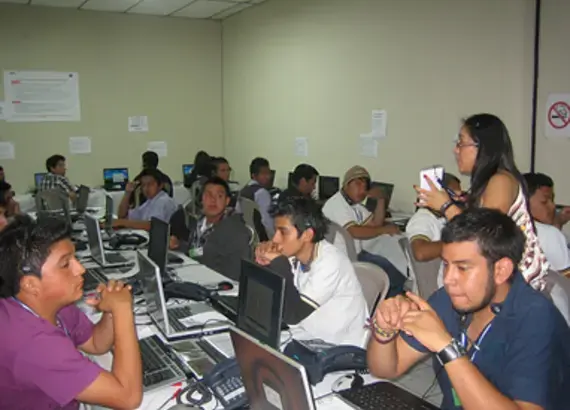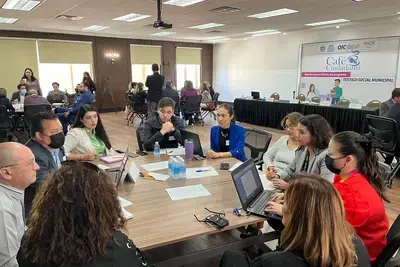
Success Story
Guatemalan Civic Groups Preparing to Observe Nov. 6 Presidential Runoff
While Guatemala prepares for its Nov. 6 presidential run-off election, citizen groups are working to safeguard the credibility of the election process as they did in the first round of voting on Sept. 11. This election pits Otto Perez Molina of the Patriotic Party against Manuel Baldizón of the Renewed Democratic Freedom Party.
Citizen Action (Acción Ciudadana, AC), the Guatemalan chapter of Transparency International, will conduct a “quick count,” an advanced observation technique to accurately characterize the quality of voting and counting and project results based on actual votes cast at a statistical, random sample of polling sites observed.
AC is part of a coalition of citizen groups known as Mirador Electoral (Election Watch) that has organized observation activities, including campaign expense tracking, the participation of women and the indigenous population, and the reporting of results on election night.
On the day after the first round election, AC released quick count projections that confirmed the results announced by the Supreme Electoral Tribunal (Tribunal Supremo Electoral, TSE) within a 1 percent margin of error. These results were widely covered in the media, which helped to increase public confidence in the integrity of the election process, particularly in light of delays in the release of official results on election night. Similar checks will be provided for the race between Molina, who received 36 percent of the first-round vote, and Baldizón, who tallied 23 percent.
For the Sept. 11 election, AC dispatched approximately 3,500 observers to all of the country’s 333 municipalities. By midday, AC reported that nearly 99 percent of polling stations had the necessary electoral materials, including the registry of voters, tally books, complaint forms, indelible ink, ballot boxes and stamps and seals. Ninety percent of polling places had more than two observers from political parties. With observers at the polls, parties can independently verify that poll workers were impartial and voting and vote-counting was free of fraud. This increases confidence in the electoral results and reduces the chances that any single party will question the outcome.
AC also analyzed gender representation among poll workers, finding that 44 percent of polling station presidents were women. The observers said that Guatemalans were able to vote without problems in 73 percent of the observed polling places. In stations where problems did occur, nearly half involved voters who did not appear in the voter registry, while almost a third involved a lack of sufficient ballots. Some 17 percent of voters experienced problems related to identification cards, which was less than expected since Guatemala is transitioning to new voter cards and both the old and new forms of identification were accepted.
Between Sept. 10 and the poll closing on Sept. 11, AC’s Anti-Corruption Legal Assistance Office (Centro de Asistencia Legal Anticorrupción) received 165 complaints related to the electoral process. These included reports of transporting voters for one municipality to another, vote-buying, voter intimidation and campaigning outside of the permitted period.
Prior to the election, some 1.3 million voters were added to the voter rolls—particularly women, youth and indigenous citizens. As a result, women for the first time represented the majority of the seven million Guatemalans registered to vote. In addition, Guatemala will have its first woman vice president since both run-off contenders have women running mates.
Despite these advances, women were elected to only 5 percent of 491 congressional and municipal positions. Women won 19 of 158 congressional seats and seven of 333 mayoralties. Of those municipalities, 110 will be led by indigenous mayors. This represents just 33 percent for an indigenous community that makes up nearly 50 percent of the population and a decline from the 2007 elections, which saw indigenous leaders win 123 of the country’s mayoralties.
Looking toward the run-off, Mirador Electoral has pointed out that both finalists have surpassed the ceiling for campaign spending set by electoral law and regulated by the TSE. Mirador is advocating that the candidates publically release information on the source of their campaign contributions. While Mirador expressed confidence in the TSE’s independence, the coalition has encouraged analysis of why the reporting of the official results was delayed on election night.
Mirador Electoral Members
-
Citizen Action (Acción Ciudadana, AC)
-
Association for Development, Organization, Services and Sociocultural Studies (Asociación para el Desarrollo, la Organización, Servicios y Estudios Socioculturales, DOSES)
-
Latin American Faculty of Social Sciences (Facultad Latinoamericana de Ciencias Sociales, FLACSO)
-
Central American Institute for Political Studies (Instituto Centroamericano de Estudios Políticos, INCEP)
-
More Women, Better Politics (Más Mujeres, Mejor Política, MMMP)
-
National Network of Mayan Youth Organizations (Red Nacional de Organizaciones de Jóvenes Mayas, RENOJ)
Related:
Published Oct. 31, 2011



